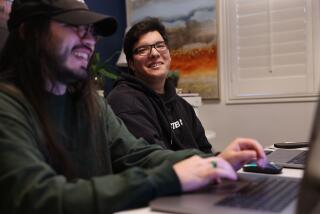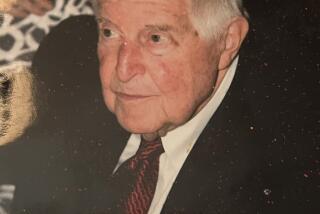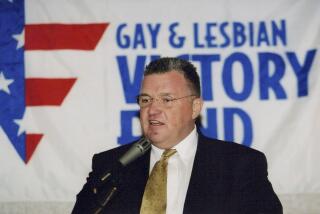Richard Devylder dies at 46; longtime disability rights activist
Disability rights activist Richard Devylder, who was born without arms or legs, knew that people meeting with him for the first time were likely to be a bit uncomfortable.
So he used it.
“It works to my advantage, my disability,” Devylder said in a 2000 interview with The Times. “It helps people, but it puts them off guard too. It disarms them if they are hostile.
“I use it any way I can.”
Devylder, 46, who worked at the U.S. Department of Transportation and several state agencies where he pushed for transportation and emergency preparedness reforms, has died of natural causes. He was found unresponsive at his Long Beach home on Aug. 8 by a caregiver, said his mother, Joan.
Known for working long hours and traveling extensively to promote his causes, Devylder retired in March because of the strain on his body, but he continued to do volunteer work. He was fiercely independent, using caregivers as little as possible and even swimming — with the use of a lift chair to get himself into and out of a pool — for up to an hour every day, alone.
There was a lighter side to him — he was known for giving affectionate head butts, and he loved attending sports events, especially Lakers games.
Team president and co-owner Jeanie Buss tweeted last week, “#Lakers Family lost one of our best, Richard Devylder. His was a life well lived.”
Devylder (pronounced DEE-vel-der) got around in an electric wheelchair he controlled with a shoulder stub. He pushed the staffs at the agencies where he worked, as well as himself, especially in regard to emergency planning for disabled people caught in situations such as floods or fires.
“He would tell his staff, ‘I’m being tough on you now, so you don’t have to live with the results of people dying later,’” said his longtime friend Brenda Premo, director of the Harris Family Center for Disability and Health Policy at Western University of Health Sciences.
Devylder also knew how to inject humor into a situation when dealing with the public.
Not long after he was appointed the Transportation Department’s senior advisor for accessible transportation in 2010, he gave a speech in Washington at an event marking the 20th anniversary of the Americans with Disabilities Act. He brought up the problems disabled people encounter on commercial flights.
“My friends in California told me they’re going to measure my effectiveness in this job by whether or not they can actually ride in their wheelchairs on an airplane,” he told the audience, which included Transportation Secretary Ray LaHood. “I told them my goal was to get into the bathroom, but we’d work on that part too.”
He went on to gently scold the agency for giving lip service to emergency planning for disabled people.
“We’ve talked about it a lot over the years,” he said. “It needs to be integrated fully.”
A few weeks before he died, Devylder participated in a disability issues conference at California Baptist University in Riverside. He told disabled people they should not simply rely on others in emergency situations.
“He said, ‘You have to make your own plan, form your own team,’” Premo said. “‘If you just sit back and say, “I’m disabled, people will take care of me,” you’ll be dead.’”
He was born July 25, 1969, in Pasadena to parents who abandoned him in the hospital. In a video on his life, Devylder said his biological parents, whom he never met, left him there because they “believed I was the result of a sin either one or both committed.”
About two months after he was born, he was spotted by single mother Joan Devylder, who had fostered other children. “He was taking in the whole world with his eyes,” she said. She adopted him, taking him home to Whittier. “Every baby deserves to live,” she said, “but I never dreamed of what he would become.”
In addition to his mother, he is survived by sisters Cheryl Devylder, Sharon Taylor, Crystal Wallace and Tina Devylder; and brother Robert Devylder.
When Richard Devylder was 3, he asked for his own electric wheelchair, showing his doctor he would be able to control it. When it came time for him to attend school, he was placed in special education classes, but his mother was frustrated with them.
“They did not dwell on academics,” she said. “My boy was smart, we needed academics.”
She enrolled him in Christian schools, where he was more mainstreamed. He graduated from Whittier Christian High School and went on to Biola University and then Cal State Long Beach, where he earned a bachelor’s degree in communications.
With the help of friends, Devylder made adaptations to his chair and used other gadgets to make himself largely independent. Using a pencil or pen in his mouth, he typed on a computer keyboard and used his shoulder to manipulate a mouse. He also used voice-recognition software.
A video about how he accomplished everyday tasks, including his daily swimming for exercise, was made when he worked as deputy director of the California Department of Rehabilitation. It can be viewed on the government Fast Lane blog.
Devylder also worked two stints at the California Governor’s Office of Emergency Services and was director of the Dayle McIntosh Center for the Disabled in Anaheim.
He went from job to job because he was in demand, Premo said. “People kept stealing him.”
Devylder said public transportation accessibility was key to his work, as well as his social life.
“You can only depend on your friends for so long,” he said at the Department of Transportation’s ADA event. “After a few rides, they’re not going to be a taxi anymore, and they’re very clear about that.”
Accessibility, he said, needed to be a natural part of public life.
“I came to D.O.T. with only one goal, and that is that access and functional needs is integrated into everything that we do,” he said. “And it’s no longer a question, and it’s no longer seen as special.
“But it’s just what we do.”
Twitter: @davidcolker
More to Read
Start your day right
Sign up for Essential California for the L.A. Times biggest news, features and recommendations in your inbox six days a week.
You may occasionally receive promotional content from the Los Angeles Times.







